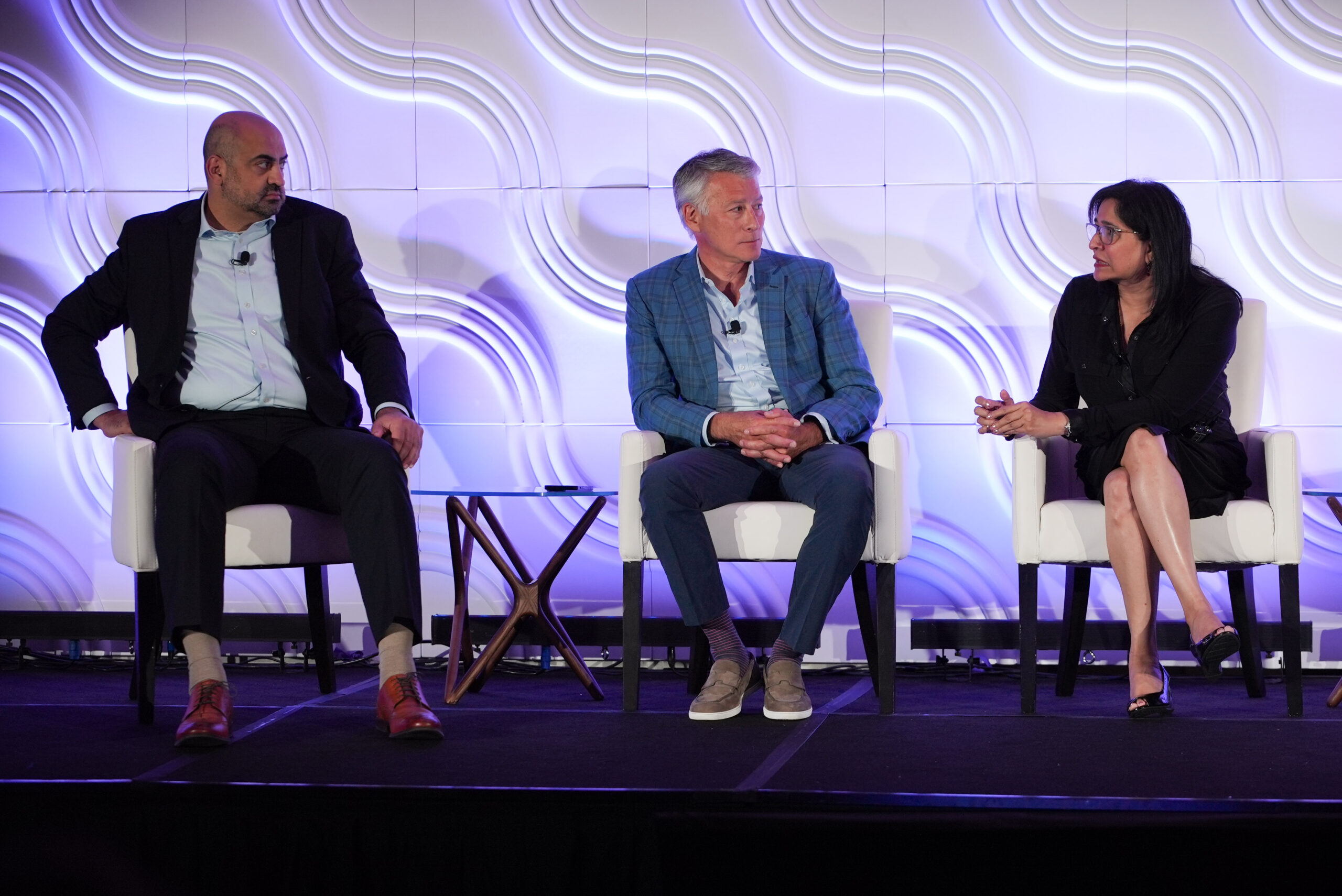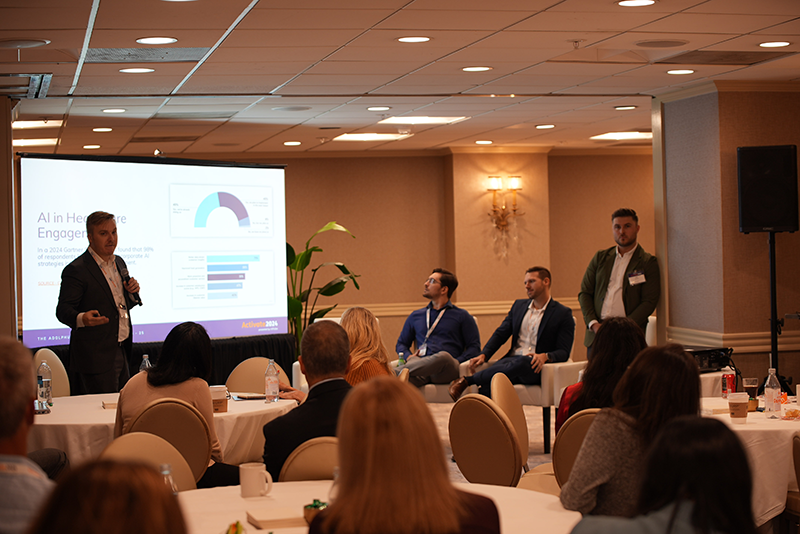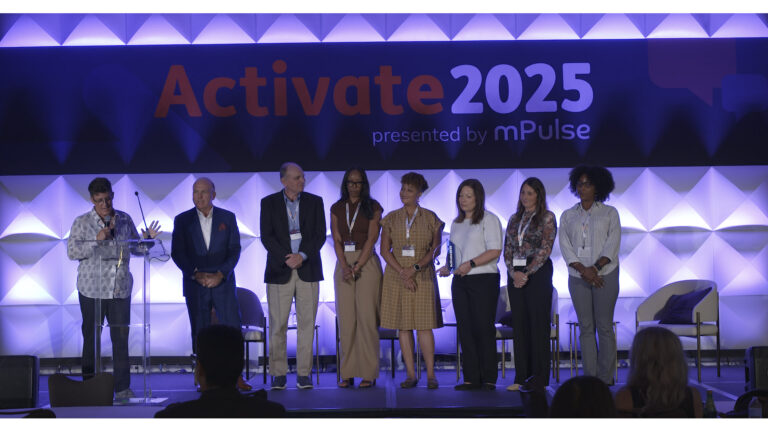Activate 2024 was the 8th consecutive Activate conference, and it focused on a key theme: ‘From Insights to Intervention, Creating Consumer-Centric Health Experiences’.
This topic addressed known challenges in healthcare—fragmented data and siloed engagement strategies that deliver abrasive one-to-many experiences for health consumers. Key insights were uncovered, and innovative technologies explored across 3 keynotes, 5 panel discussions, 2 workshops, and a collection of user groups and industry trend deep dives. It was both fun and an honor to MC the conference, and here are 5 key takeaways:
1. Building Trust with Members
One of the core themes that emerged was the imperative for health plans to foster trust with their members. Trust is foundational for improving engagement and satisfaction. Rex Wallace, Founder and Principal at Rex Wallace Consulting, speaking on the Talking CAHPs panel shared the insight ‘clear is kind, unclear is unkind’.
Attendees emphasized that transparent communication, empathy, and consistent support can significantly enhance member relationships. A challenge the whole industry faces is how to measure trust. It was generally agreed that the CAHPS survey is a measure of satisfaction and not an effective measure of trust. And while trust maybe hard to directly measure, it was agreed that when members feel valued and understood, they are more likely to engage with their health plans actively and utilize available resources effectively. How members engage and associated metrics can provide important insights about a health plans relationship with their members.
2. The Power of Data: Are We Asking the Right Questions?
 Healthcare is rich with data, yet the challenge remains: are we leveraging it effectively? Conference speakers highlighted the importance of asking the right questions before collecting and analyzing data. It’s about shifting our focus from merely gathering and reporting on numbers to deriving actionable insights that can guide decision-making in a more open-minded and meaningful way. Within healthcare organizations, business SME’s must play a critical role in engaging with data and insights functions to use their expertise to ask the right questions and point analytics projects towards the most important problems.
Healthcare is rich with data, yet the challenge remains: are we leveraging it effectively? Conference speakers highlighted the importance of asking the right questions before collecting and analyzing data. It’s about shifting our focus from merely gathering and reporting on numbers to deriving actionable insights that can guide decision-making in a more open-minded and meaningful way. Within healthcare organizations, business SME’s must play a critical role in engaging with data and insights functions to use their expertise to ask the right questions and point analytics projects towards the most important problems.
In the Executive Panel, Amin Serehali from Independent Health, Bihu Sandhir from Blanchard Valley Health System and Kevin Adams from UST HealthProof discussed how key drivers of success were frameworks for making insights actionable and consistent shared views of data to establish common goals and deliver a better consumer experience.
3. Health Experience and Insights (HXI) is an Enabler for Innovation
mPulse shared key technical capabilities that demonstrated the efficiencies of connecting ‘insights to interventions’ using its integrated Health Experience and Insights (HXI) environment. Through four User Groups and technical workshops, participants explored how integrated predictive analytics and engagement tools allowed health plans to rapidly deploy personalized engagement programs aligned to key member attributes identified through predictive analytics.
Similarly, the integrated capabilities enable rapid deployment of activation programs to drive adoption and utilization of self-service digital navigation tools. The HXI ecosystem creates an integrated digital environment build around a unified member profile which enables deployment of advanced orchestration and closed-loop analytics tools.
4. The Role of LLMs in Health Engagement
A particularly exciting discussion centered on the potential of Large Language Models (LLMs) in healthcare. These advanced generative AI tools can analyze unstructured data from various member touchpoints, uncovering valuable insights. However, it was also highlighted that LLMs are not a silver bullet solution to solve challenges and inefficiencies across the healthcare ecosystems.
 In the AI in Healthcare Engagement Workshop, technical leads from mPulse shared a vision of how a mix of AI capabilities is necessary to optimize the consumer health journey. For example, Predictive AI provides insights on how members will behave so that outreach efforts can be optimized to reduce costs and improve program outcomes. This capability sits alongside generative AI approaches that can be used to categorize unstructured member responses and create insights on sentiment and important inputs for predictive models. This broad understanding of applications of different AI types will help health plans better address the diverse needs of their members while avoiding over-reliance on any single technology.
In the AI in Healthcare Engagement Workshop, technical leads from mPulse shared a vision of how a mix of AI capabilities is necessary to optimize the consumer health journey. For example, Predictive AI provides insights on how members will behave so that outreach efforts can be optimized to reduce costs and improve program outcomes. This capability sits alongside generative AI approaches that can be used to categorize unstructured member responses and create insights on sentiment and important inputs for predictive models. This broad understanding of applications of different AI types will help health plans better address the diverse needs of their members while avoiding over-reliance on any single technology.
5. Challenging the Status Quo
Finally, we must be willing to challenge the status quo. Accepting ‘abnormal as normal” in healthcare perpetuates issues that need urgent attention. Dr Sachin Jain, one of the conference key notes, challenged us all to confront the tough issues head-on, advocating for transformative changes that address rampant inefficiency and restore power to care constituents who effect genuine improvement in health outcomes. Only by addressing these challenges can we pave the way for a more effective and equitable healthcare system.
Conclusion
The Activate Health Engagement Conference was a gathering of minds and an opportunity to discuss a shared vision for a more efficient and effective health activation. To do this, we must work collaboratively across teams to create a healthcare environment that prioritizes trust, effective data use, human connection, innovative technology, and bold transformation. Together, we can make meaningful strides toward a healthier future for all. Thank you for being part of this crucial conversation!






